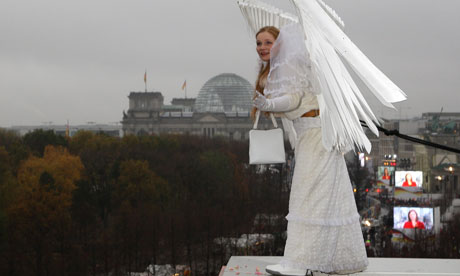East German atheism can be seen as a form of continuing political and regional identification – and a taste of the future

A woman dressed as an angel waves from a roof top near the German Reichstag on the 20th anniversary of the fall of the Berlin Wall. Photograph: Andreas Rentz/Getty Images
They are sending missionaries to eastern Germany. A recent study called Beliefs About God Across Time and Countries found that 52.1% of people asked whether they believed in God identified themselves as atheists. This compared with only 10.3% in western Germany. Indeed, the survey was unable to find a single person under the age of 28 in eastern Germany who believed in God. Obviously there are some – I think I may have even met some once – but the survey was unable to find them. On the face of it this is an extraordinary finding and it is something that needs some careful explanation.
Different reasons are adduced for the absence of religion in the east. The first one that is usually brought out is the fact that that area was run by the Communist party from 1945 to 1990 and that its explicit hostility to religion meant that it was largely stamped out. However, this is not entirely the case. In fact, after initial hostilities in the first years of the GDR, the SED came to a relatively comfortable accommodation with what was called the Church in Socialism. The churches in the GDR were given a high degree of autonomy by SED standards and indeed became the organisational focus of the dissident movement of the 1990s, which was to some extent led by Protestant pastors.
In addition to an accommodation with religion, the party also deliberately created alternative poles of integration for the population. Young people were brought up in a highly ideological atmosphere and were required to undergo a so-called Jugendweihe – a sort of atheist confirmation. Interestingly, this ceremony has survived the end of communism and many young people still voluntarily enter into it. Equally, especially under Eric Honecker in the 1970s and 80s, an attempt was made to create a sort of "GDR patriotism", in which figures from Prussian history such as Frederick the Great were put back on their plinths in East Berlin and integrated into the Communist narrative of the forward march of history. Martin Luther, Thomas Münzer and other figures from the Reformation were also recruited into the party.
Another factor is that religion in eastern Germany is also overwhelmingly Protestant, both historically and in contemporary terms. Of the 25% who do identify themselves as religious, 21% of them are Protestants. The other 4% is made up of a small number of Catholics as well as Muslims and adherents of other new evangelical groups, new-age sects or alternative religions. The Protestant church is in steep decline with twice as many people leaving it every year as joining.
If we were to follow the Weberian line on this, then a highly Protestant area undergoing rapid modernisation would almost automatically experience a process of radical secularisation going hand-in-hand with industrialisation, a process which was only speeded up by the communist obsession with heavy industry.
When we look at western Germany however, we see that there Catholics are in a majority and indeed, political power in West Germany has traditionally been built on western-orientated Catholic support for the Christian Democratic Union in the south and west. Indeed, the first chancellor of postwar West Germany, Konrad Adenauer, had been mayor of Cologne in the 1930s and even then was in favour of the division of Germany and a "Rhineland Alliance" as a sort of precursor of the European Union.
What all of this means is that rather than simply just being an area that was occupied by the Soviet Union and their satraps in the East German Communist party, the eastern part of Germany has an identity which – almost a quarter of a century on – continues to make unification more difficult than expected. Religious confession, or rather the lack of it, plays an important role in this. This has led some to talk of East German atheism as a form of continuing political and regional identification. For example, in 2000 the Catholic theologian Eberhard Tiefensee identified what he called an "East German folk atheism" which could be argued to constitute a substantial part of a regional identity against West German Catholic domination.
Secularisation processes are under way throughout the continent and the role of religion and the church in modernity are being questioned everywhere, from gay marriage to women priests to abortion and on to whether the EU should identify itself as a Christian entity. The question should perhaps be whether it is actually folk atheism that represents the future of Europe.

No comments:
Post a Comment